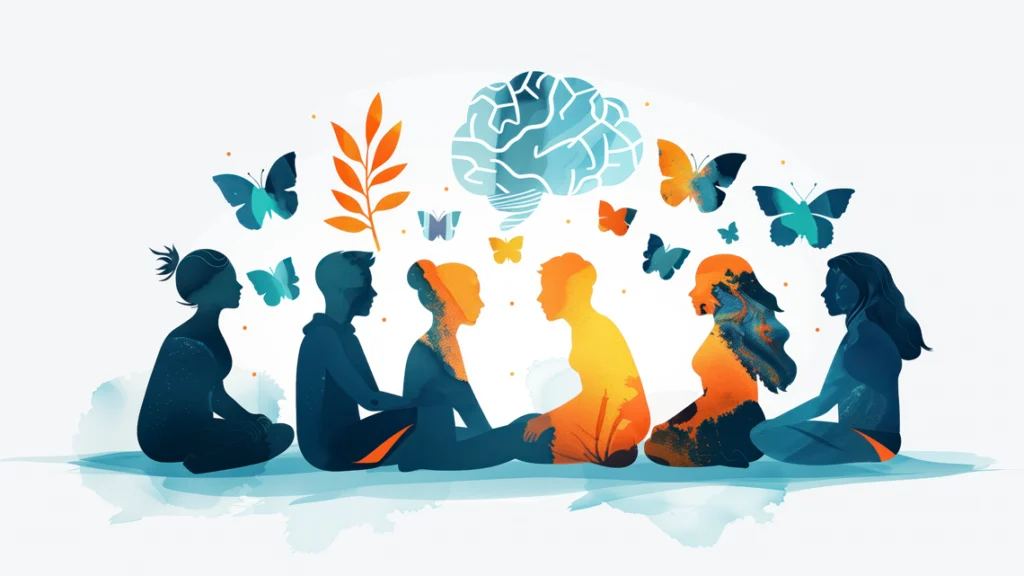
Table of Contents
Attention Deficit Hyperactivity Disorder (ADHD) is a well-known neurodevelopmental disorder in society. However, ADHD and comorbid disorders often coexist together. This phenomenon, known as “comorbidity,” refers to the presence of multiple disorders simultaneously. It is estimated that approximately 80% of individuals with ADHD have at least one comorbid condition, and 50% have two or more. This highlights the need for a broader perspective and a comprehensive approach when addressing ADHD.
The impact of ADHD on an individual’s life is not limited to attention deficits and hyperactivity symptoms. Comorbid conditions can make emotional, social, and cognitive aspects of life more complex. In this article, I will discuss the conditions commonly associated with ADHD and their effects on an individual’s life.
Most research indicates that environmental factors do not cause ADHD but can lead to the development of comorbidities or exacerbate ADHD symptoms, making them more pronounced or severe.
Oppositional Defiant Disorder (ODD) and Conduct Disorder (CD)
Two of the common conditions seen in individuals with ADHD are Oppositional Defiant Disorder (ODD) and Conduct Disorder (CD). These disorders usually emerge during childhood and can negatively impact relationships in a person’s social environment.
Personal insight: In my opinion, individuals who experience intense violence or pressure from parents or authority figures during childhood are more likely to develop these disorders. Having a parent or sibling with psychological issues can further influence the individual.
- ODD: Characterized by stubborn, hostile, and defiant behaviour toward authority figures. Children frequently engage in arguments, disobey rules and exhibit irritability.
- CD: A more severe condition involving behaviours that violate societal norms and rules, such as violence, property destruction, and deceit.
Connection to ADHD: Impulsivity and emotional regulation issues related to ADHD can increase the risk of ODD and CD. Studies suggest that hyperactive behaviours raise the likelihood of progression from ODD to CD.
Anxiety Disorders
Anxiety disorders are among the most frequently observed comorbid conditions in individuals with ADHD. The prevalence is approximately 33% in children and up to 50% in adults.
Personal insight: Considering ADHD is a physiologically supported emotional sensitivity, it is highly likely for individuals to develop anxiety disorders. For example, children who feel or are made to feel unaccepted by their families may experience separation anxiety or social anxiety in their relationships. Anxiety disorder is one of the most frequently observed effects of ADHD. Its severity often depends on environmental factors, family communication quality, and understanding within the household.
Anxiety disorders can manifest in different forms:
- Generalized Anxiety Disorder: Persistent worry and fear.
- Social Anxiety Disorder: Intense anxiety in social settings.
- Separation Anxiety: Fear of being apart from loved ones.
- Specific Phobias: Extreme fear of certain situations or objects.
Connection to ADHD: Anxiety disorders can overlap with ADHD symptoms like difficulty focusing and restlessness. Proper diagnosis and treatment planning are essential. Untreated ADHD may further aggravate anxiety.
Depression
Depression is another condition that frequently co-occurs with ADHD. Research shows that individuals with ADHD have a lifetime risk of depression ranging from 26% to 45%.
Personal insight: Individuals who experience emotional sensitivity, childhood trauma, and anxiety may face deeper depression as they enter adulthood, particularly in work and social life. Those whose ADHD was not diagnosed or supported in childhood are likely to experience worsening depression as they age.
Developmental process:
- ADHD often emerges first.
- When left untreated or undiagnosed, individuals may face social isolation, academic failure, and low self-esteem.
- These challenges increase the risk of depression over time.
Depression’s impact on ADHD can significantly reduce an individual’s quality of life, making it essential to address both conditions together.
Substance Use Disorders
Individuals with ADHD are at higher risk of developing substance use disorders, particularly during adolescence.
Personal insight: Rather than viewing this solely as substance use disorder, it is more accurate to examine it under the broader category of addiction. Neurologically, individuals with dopamine deficiencies are more likely to develop addictions, whether to alcohol, gambling, substances, or shopping. The specific addiction depends on environmental factors.
Underlying reasons:
- Impulsivity: Quick decision-making and risky behaviours.
- Social difficulties: Feelings of loneliness or exclusion.
- Self-medication: Using substances to alleviate ADHD symptoms.
Substance use disorders should be addressed as part of ADHD treatment, with a supportive approach for the individual.
Bipolar Disorder
Bipolar disorder is a complex condition that can co-occur with ADHD. This relationship can make the diagnosis, especially in children and adolescents, more challenging.
Personal insight: An important aspect here is that inattentive-type ADHD symptoms in girls, teenagers, and adult women often remain undiagnosed due to societal pressures and expectations. As a result, comorbid conditions develop at higher rates. Additionally, specialists lacking sufficient experience with ADHD may misinterpret inattentive ADHD symptoms as anxiety, depression, or bipolar disorder.
Connection to ADHD:
- Chronic irritability and emotional instability are common in both bipolar disorder and ADHD. However, manic or hypomanic episodes distinguish bipolar disorder.
- Long-term observation is crucial to differentiate between the two conditions.
Tourette Syndrome
Tourette syndrome is a neurological disorder characterized by involuntary tics and is often associated with ADHD. More than 50% of individuals with Tourette syndrome also exhibit ADHD symptoms.
Additional challenges: Tourette syndrome may also coexist with obsessive-compulsive disorder and depression, making treatment more complex when combined with ADHD.
Conclusion
ADHD is a complex condition that extends beyond attention deficits and hyperactive/impulsive behaviours. Comorbid disorders further complicate the lives of individuals. However, with accurate diagnosis and a comprehensive treatment plan, both ADHD and comorbid disorders can be effectively managed. Addressing emotional and social needs is critical in this process.
It is essential for individuals with ADHD to recognize, accept, and focus on their strengths to improve their quality of life. Whether or not they are aware of having ADHD, seeking support from a psychologist, psychiatrist, or behavioural therapist is crucial. Working with an ADHD coach can also significantly enhance life quality during the process of self-awareness and life organization.
Remember, ADHD is not something to fear or grieve over. Instead, with increased awareness, it can open the doors to unimaginable successes and turn into a unique talent.


